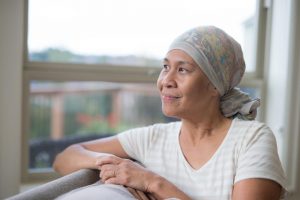The Well-Being and Quality of Life in Cancer Patients are Related to Spirituality
By John M. de Castro, Ph.D.
“Many patients with cancer rely on spiritual or religious beliefs and practices to help them cope with their disease. This is called spiritual coping.” – National Cancer Institute
A cancer diagnosis has a huge impact on most people. Feelings of depression, anxiety, and fear are very common and are normal responses to this life-changing experience. These feeling can result from changes in body image, changes to family and work roles, feelings of grief at these losses, and physical symptoms such as pain, nausea, or fatigue. People might also fear death, suffering, pain, or all the unknown things that lie ahead. So, coping with the emotions and stress of a surviving cancer is a challenge and there are no simple treatments for these psychological sequelae of cancer.
Religion and spirituality become much more important to people when they survive cancer. It is thought that people take comfort in the spiritual when facing mortality. Hence, spirituality may be useful for cancer patients to cope with their illness and the psychological difficulties resulting from the disease. Thus, there is a need to study the relationships of spirituality on the well-being and quality of life of cancer patients.
In today’s Research News article “Association between spiritual well-being, quality of life, anxiety and depression in patients with gynecological cancer in China.” (See summary below or view the full text of the study at: https://www.ncbi.nlm.nih.gov/pmc/articles/PMC7793354/) Chen and colleagues recruited women with primary gynecological cancer and had them complete measures of quality of life with cancer, global health, spiritual well-being, anxiety, and depression.
They found that the higher the levels of spiritual well-being the higher the levels of global health and quality of life and the lower the levels of depression and anxiety. Multiple regression analysis revealed that religion, depression, anxiety and quality of life were the strongest predictors of spiritual well-being.
These findings are correlational and as a result causation cannot be determined. Regardless, the results clearly show that spiritual well-being is significantly related to better health and quality of life and lower psychological problems in women with primary gynecological cancer. These findings are similar to those seen with other forms of cancer that spirituality is associated with the patient’s quality of life and well-being. This raises the possibility that promoting spirituality in cancer patients may improve their physical and psychological well-being. It remains for future research to explore this possibility.
So, the well-being and quality of life in cancer patients are related to spirituality.
“Consistent associations between spirituality, spiritual well-being, and health outcomes found in published studies highlight the importance of providing spiritual care to enhance cancer patients’ spiritual well-being and address their spiritual needs.” – Yi-Hui Lee
CMCS – Center for Mindfulness and Contemplative Studies
This and other Contemplative Studies posts are also available on Google+ https://plus.google.com/106784388191201299496/posts and on Twitter @MindfulResearch
Study Summary
Chen, J., You, H., Liu, Y., Kong, Q., Lei, A., & Guo, X. (2021). Association between spiritual well-being, quality of life, anxiety and depression in patients with gynaecological cancer in China. Medicine, 100(1), e24264. https://doi.org/10.1097/MD.0000000000024264
Abstract
The physical and psychological condition of patients with gynaecological cancer has received much attention, but there is little research on spirituality in palliative care. This study aimed to investigate spiritual well-being and its association with quality of life, anxiety and depression in patients with gynaecological cancer. A cross-sectional study was conducted in China in 2019 with 705 patients diagnosed with primary gynaecological cancer. European Organisation for Research and Treatment of Cancer quality of life instruments (EORTC QLQ-SWB32 and EORTC QLQ-C30) and the Hospital Anxiety and Depression Scale were used to measure spiritual well-being, quality of life, anxiety and depression. Univariate and multiple linear regression analyses were performed to examine associations between spiritual well-being, quality of life, anxiety and depression. Functioning scales and global health status were positively correlated with spiritual well-being (P < .05). Anxiety and depression were negatively correlated with spiritual well-being (P < .05). Depression (−0.362, P < .001) was the strongest predictor of Existential score. Anxiety (−0.522, P < .001) was the only predictor of Relationship with self. Depression (−0.350, P < .001) and Global health (0.099, P = .011) were the strongest predictors of Relationship with others. Religion (−0.204, P < .001) and Depression (−0.196, P < .001) were the strongest predictors of Relationship with someone or something greater. Global health (0.337, P < .001) and Depression (−0.144, P < .001) were the strongest predictors of Global-SWB. Well spiritual well-being is associated with lower anxiety and depression, and better quality of life. Health providers should provide more spiritual care for non-religious patients and combine spiritual care with psychological counselling to help patients with gynaecological cancer, especially those who have low quality of life or severe symptoms, or experience anxiety or depression.
https://www.ncbi.nlm.nih.gov/pmc/articles/PMC7793354/
